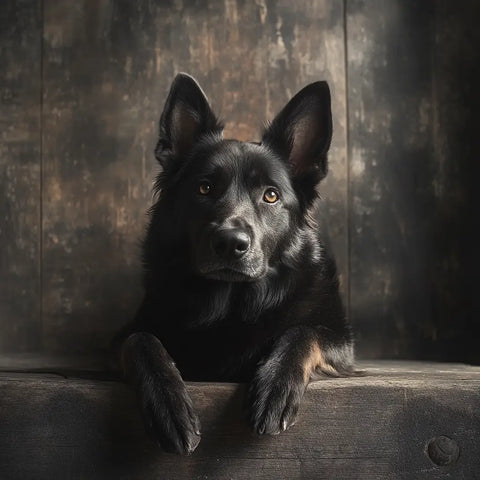Puppy puzzle toys are an excellent way to enhance your puppy's cognitive development while keeping them entertained. These innovative toys not only provide fun but also serve as valuable tools for mental stimulation.
Studies have shown that puppies who engage with puzzle toys regularly experience significant improvements in their problem-solving abilities within just two weeks.
In this article, we’ll dive into the many benefits of puppy puzzle toys, highlighting how they can contribute to your puppy’s mental growth. We’ll also share tips on incorporating these toys into your puppy's routine to maximize their cognitive development during these crucial early stages.

What Are Puzzle Toys for Puppies?
Puzzle toys for puppies are interactive and mentally stimulating devices designed to engage your puppy’s mind while providing both entertainment and rewards.
These toys are specifically crafted to challenge your puppy’s cognitive abilities, encouraging problem-solving and critical thinking in a fun and rewarding way. As your puppy interacts with these toys, they not only stay entertained but also develop important skills for mental growth.
-
Treat-dispensing balls: These toys release kibble or treats as your puppy plays, encouraging them to engage in continuous activity. This type of toy helps build problem-solving skills while rewarding your puppy for their efforts.
-
Sliding tile puzzles: These puzzles hide treats behind movable tiles, requiring your puppy to figure out how to shift the pieces to uncover the rewards. This activity helps improve your puppy's dexterity and cognitive thinking as they work to access the treats.
-
Interactive mats: With hidden compartments designed to hold treats, these mats prompt your puppy to use their sense of smell and problem-solving abilities to find the goodies. This toy encourages focus and curiosity while providing mental stimulation.
-
Hide-and-seek toys: These toys often include squeaky plush elements that your puppy must locate and retrieve, adding an element of excitement. They engage your puppy’s instincts and problem-solving skills while providing a fun challenge.
Each type of puzzle toy is designed to enhance your puppy's mental growth, encouraging patience, focus, and critical thinking.
The Science Behind Puppy Brain Games
Recent veterinary research has revealed that mental stimulation is just as essential for puppies as physical exercise. Engaging in activities such as puzzle games activates various areas of the brain, triggering cognitive development and strengthening neural connections.
This type of mental exercise not only improves overall brain function but also supports a puppy's ability to adapt to new environments and situations. By regularly interacting with puzzle toys, puppies experience enhanced brain activity, which can lead to a well-rounded, healthy mind.
Mental Benefits of Puzzle Toys
Modern veterinary behaviorists have identified several important advantages to incorporating puzzle toys into a puppy’s daily routine, with each toy serving as a unique tool for cognitive growth:
-
Enhanced Problem-Solving Skills: Puzzle toys require puppies to think critically and use problem-solving strategies to achieve their goals, such as getting a treat. This helps puppies develop the mental flexibility needed to tackle challenges as they grow.
-
Improved Memory and Learning Capacity: When puppies work to solve a puzzle and successfully retrieve a treat, they reinforce their memory and learning capacity. Repeated exposure to puzzle toys can help improve their ability to retain and recall information.
-
Better Focus and Attention Span: Engaging with puzzle toys encourages puppies to stay focused on the task at hand, improving their attention span. This kind of sustained mental activity helps them learn to concentrate for longer periods, which is crucial for their development.
-
Increased Emotional Intelligence: Puzzle toys can help puppies regulate their emotions by providing a rewarding experience through problem-solving. This can promote emotional resilience, teaching puppies to cope with frustration and build patience as they learn how to work through challenges.
Overall, the mental benefits of puzzle toys contribute to a well-rounded, healthy puppy, preparing them for a lifetime of learning and emotional growth.

Why Puzzle Toys Are Essential for Modern Puppies
In today’s world, puppies face a wide range of stimuli and environments, and they need more than just physical exercise to thrive. Mental challenges are equally important for their overall development.
Puzzle toys provide a fun and rewarding way to engage a puppy’s mind, offering multiple benefits that support their growth. These toys help meet the mental stimulation needs of puppies, allowing them to grow into well-adjusted, balanced dogs.
Preventing Behavioral Issues
Puppies with access to puzzle toys are 60% less likely to develop destructive behaviors compared to those who don’t receive mental stimulation. Without sufficient mental engagement, puppies often turn to undesirable behaviors, such as chewing, digging, or excessive barking, as outlets for their energy.
Puzzle toys address this by providing a positive outlet for their natural curiosity and exploration instincts. They encourage puppies to focus on a task and problem-solve, reducing the chances of anxiety-driven behaviors, such as destructive chewing or pacing.
These toys also help prevent boredom-related destruction by keeping your puppy occupied with a mentally stimulating activity, making them feel more content and satisfied.
Supporting Natural Development
Puzzle toys not only entertain but also support your puppy’s natural instincts and developmental milestones. For example, these toys satisfy their foraging behavior, mimicking the instinct to hunt for food or treasures, which is especially important for puppies that are developing sensory and motor skills.
By engaging with puzzle toys, puppies are also given the opportunity to develop problem-solving skills. These toys require them to figure out how to manipulate pieces, move tiles, or find hidden compartments, which helps sharpen their cognitive abilities.
Additionally, puzzle toys often offer social learning opportunities, where puppies can learn by watching their owners or other dogs, leading to improved communication and interaction skills. These natural behaviors are fundamental to a puppy’s development and well-being, making puzzle toys an essential part of their routine.
By providing both mental and emotional enrichment, puzzle toys help modern puppies thrive in a world that demands much more than just physical activity. They help prevent behavioral problems, support natural instincts, and encourage lifelong learning.
Choosing the Perfect Puzzle Toy for Your Puppy
Selecting the right puzzle toy for your puppy is key to ensuring they get the most out of the mental stimulation while staying safe and engaged. The right toy will cater to your puppy’s developmental stage, stimulate their cognitive growth, and provide a safe, fun activity. Here are some important factors to consider when choosing the perfect puzzle toy:
Age and Development Stage
It’s important to match the toy’s complexity with your puppy’s age and cognitive abilities. Puppies at different stages of development have varying levels of problem-solving skills, so selecting a toy that aligns with their mental capabilities can help them succeed and stay motivated.
8-12 weeks
At this stage, puppies are just beginning to explore their world. Simple treat-dispensing balls are perfect for this age, as they encourage basic interaction, reward-driven play, and foster early problem-solving skills. These toys typically release kibble or treats as the puppy interacts with them, keeping them engaged without being too challenging.
3-6 months
As puppies grow and their cognitive abilities develop, they can handle more basic sliding puzzles. These toys require a bit more effort to move pieces around and uncover hidden treats, providing a fun challenge that helps them enhance their problem-solving skills.
6+ months
At this stage, puppies are ready for more complex interactive games. These might include toys with multiple steps, like toys that require opening compartments, spinning pieces, or manipulating levers. These toys help develop critical thinking, patience, and persistence as puppies continue to grow.

Safety and Durability
When choosing puzzle toys for your puppy, safety and durability should be your top priorities. Puppies, especially during their teething phase, can be rough on toys, so it's important to select ones that will stand up to chewing and rough play. Here are key considerations:
-
Non-toxic, puppy-safe materials: Always look for toys made from non-toxic materials that are safe for your puppy to chew on. Puppies are naturally inclined to chew, so ensure that the materials won’t pose any harm if ingested or chewed apart.
-
Sturdy construction: Puppies can be tough on toys, especially as they grow and become stronger. Choose puzzle toys made from durable materials that can withstand constant chewing and playing without breaking down easily.
-
Appropriate size for your puppy's breed: Make sure the puzzle toy is the right size for your puppy. Toys that are too small can be a choking hazard, while toys that are too large may be difficult for smaller breeds to interact with. Select toys that are designed for your puppy’s breed size to ensure they’re both safe and effective.
Expert Tips for Introducing Puzzle Toys
Successfully introducing puzzle toys to your puppy can be a rewarding experience for both of you, but it requires a strategic approach to ensure it becomes a positive and engaging activity. Here are some expert tips for introducing puppy puzzle toys effectively:
1. Start with supervised play sessions
When introducing a new puzzle toy, always supervise your puppy during the initial play sessions. This will help ensure they don’t become frustrated or overwhelmed.
Supervision allows you to offer guidance and praise as your puppy works through the toy, making the experience enjoyable and encouraging.
2. Use high-value treats initially
To capture your puppy’s attention and keep them motivated, use high-value treats like soft treats or small bits of their favorite snacks.
These rewards will make the puzzle more enticing and encourage your puppy to engage with it. As your puppy becomes more familiar with the toy, you can gradually reduce the treat value.
3. Gradually increase difficulty levels
Start with simpler puzzle toys that offer easy rewards, and as your puppy becomes more comfortable, gradually increase the difficulty.
This could involve moving from treat-dispensing toys to sliding puzzles or more complex interactive games. Gradually increasing the complexity keeps the activity exciting and helps build your puppy’s problem-solving skills without overwhelming them.
4. Maintain consistent practice schedules
Like any new skill, consistent practice is key to your puppy’s development. Set aside time each day for your puppy to engage with their puzzle toys.
Regular practice not only helps improve their problem-solving skills but also reinforces positive behavior and mental stimulation, making puzzle play a fun and productive part of their daily routine.
Making the Most of Your Investment
To truly maximize the benefits of puzzle toys, it’s important to approach their use strategically. By introducing variety and gradually increasing difficulty, you can keep your puppy mentally engaged and motivated. Here are some tips to help you get the most out of your investment in puzzle toys:
Regular Rotation
-
Alternating between different types of puzzles: Keep your puppy engaged by regularly switching up the types of puzzle toys they interact with. Different puzzles stimulate the mind in different ways, offering fresh challenges that keep your puppy excited and curious.
-
Introducing new challenges gradually: Don’t overwhelm your puppy with too many difficult toys right away. Gradually introduce more complex puzzles as your puppy becomes more skilled at solving simpler ones. This steady progression helps them build confidence and encourages continuous mental growth.
-
Maintaining enthusiasm through variety: Puppies thrive on novelty, so introducing a mix of puzzle types and rewards can help maintain their enthusiasm. This will prevent them from becoming bored with the same toys, ensuring that puzzle play stays fun and engaging.
Progressive Challenge
-
Introduce more complex designs: As your puppy masters easier puzzles, it’s time to challenge them with more complex designs. Transitioning to puzzles that require more steps or problem-solving abilities will help strengthen their cognitive skills and keep them mentally stimulated.
-
Adjust difficulty settings when available: Some puzzle toys offer adjustable difficulty levels. Take advantage of this feature to modify the toy's challenge as your puppy becomes more adept at solving it. This allows for continuous mental stimulation without overwhelming them.
-
Combine multiple toys for advanced play: For an even greater challenge, combine several puzzle toys in one play session. You can use different types of puzzles that require different skills or set up a mini obstacle course of puzzle toys. This encourages your puppy to use a variety of problem-solving techniques, providing a richer and more engaging experience.
By rotating puzzles and progressively increasing the challenges, you’ll keep your puppy’s mind sharp, making the most of your investment in their mental growth and development.

Where to Buy the Best Dog Products for Your Furry Friend in 2025
Ready to pamper your dog with top-quality products? At our own store Doggy Elite, we offer a wide selection of essential and luxurious items to enhance your pet’s life, from engaging toys to cozy beds and stylish accessories.
Here’s why Doggy Elite is your premier destination for dog products:
-
Quality Assurance: Our products are carefully selected to meet the highest standards of safety and durability, ensuring your pet enjoys every item for years to come.
-
Wide Selection: We provide a diverse range of categories including Dog Toys, House & Bed, Grooming & Care, Accessories, Harness & Leashes, Clothing, Collars, Feeding, Traveling, and Paw Prints. Whatever you need, we have something for every dog.
-
Competitive Pricing: Enjoy great value with our affordable prices, making it easy to spoil your furry friend without breaking the bank.
-
Customer Satisfaction: Our dedicated team is committed to providing outstanding customer service, helping you choose the perfect products for your dog and offering guidance when needed.
Therefore, we invite you to explore our range of dog products today. Click below to visit our store and discover the perfect items for your beloved pet!
Conclusion
In conclusion, puzzle toys are an invaluable tool in supporting your puppy's mental and emotional development. By offering mental stimulation, satisfying natural instincts, and preventing behavioral issues, these toys play a vital role in shaping a well-rounded, happy puppy.
By selecting the right puzzle toys for your puppy’s age and abilities, introducing them strategically, and maintaining variety and progressive challenges, you can ensure that puzzle play remains a fun, rewarding experience.
With the right approach, puzzle toys can be a long-lasting investment in your puppy’s cognitive growth, helping them become a more intelligent, focused, and content companion.
Key Takeaways
-
Puzzle toys for puppies provide mental stimulation, helping puppies develop problem-solving skills, improve memory, and foster cognitive growth.
-
Engaging puzzle toys enhance puppy brain development, as research shows mental stimulation is as important as physical exercise, strengthening neural connections and improving cognitive function.
-
Puzzle toys reduce behavioral issues by making puppies less likely to develop destructive behaviors, such as chewing or digging, due to boredom or anxiety.
-
Puzzle toys support natural instincts by satisfying puppies’ innate foraging, problem-solving, and social learning instincts, contributing to their overall development.
-
Age-appropriate puzzle toys should match your puppy’s age and cognitive abilities, from simple treat-dispensing toys for young puppies to more complex interactive puzzles for older ones.
-
Safety and durability are crucial, so choose puzzle toys made from non-toxic materials, with sturdy construction and appropriate size to ensure they are safe and durable for your puppy.
-
Start with supervised play sessions when introducing puzzle toys, ensuring your puppy stays engaged and does not become frustrated.
-
Use high-value treats to motivate your puppy, beginning with rewarding treats to capture your puppy’s attention and gradually reducing treat value as they become more familiar with the puzzle.
-
Gradually increase puzzle difficulty once your puppy masters easier puzzles, progressively introducing more complex challenges to keep them mentally stimulated and engaged.
-
Regular rotation and progressive challenges can maintain variety in your puppy’s playtime, combining toys or adjusting difficulty settings to provide a progressively challenging experience.
FAQs
How long should my puppy play with puzzle toys?
Start with 5-10 minute sessions, gradually increasing to 15-20 minutes as your puppy's interest and ability grow.
Are puzzle toys safe for all puppies?
Yes, when age-appropriate toys are chosen and play is supervised initially. Always select toys designed for your puppy's size and chewing strength.
How many puzzle toys should my puppy have?
Begin with 2-3 different types of puzzles and rotate them to maintain novelty and interest.
Can puzzle toys replace regular exercise?
No, puzzle toys complement but don't replace physical exercise. Both mental and physical stimulation are essential for healthy puppy development.

